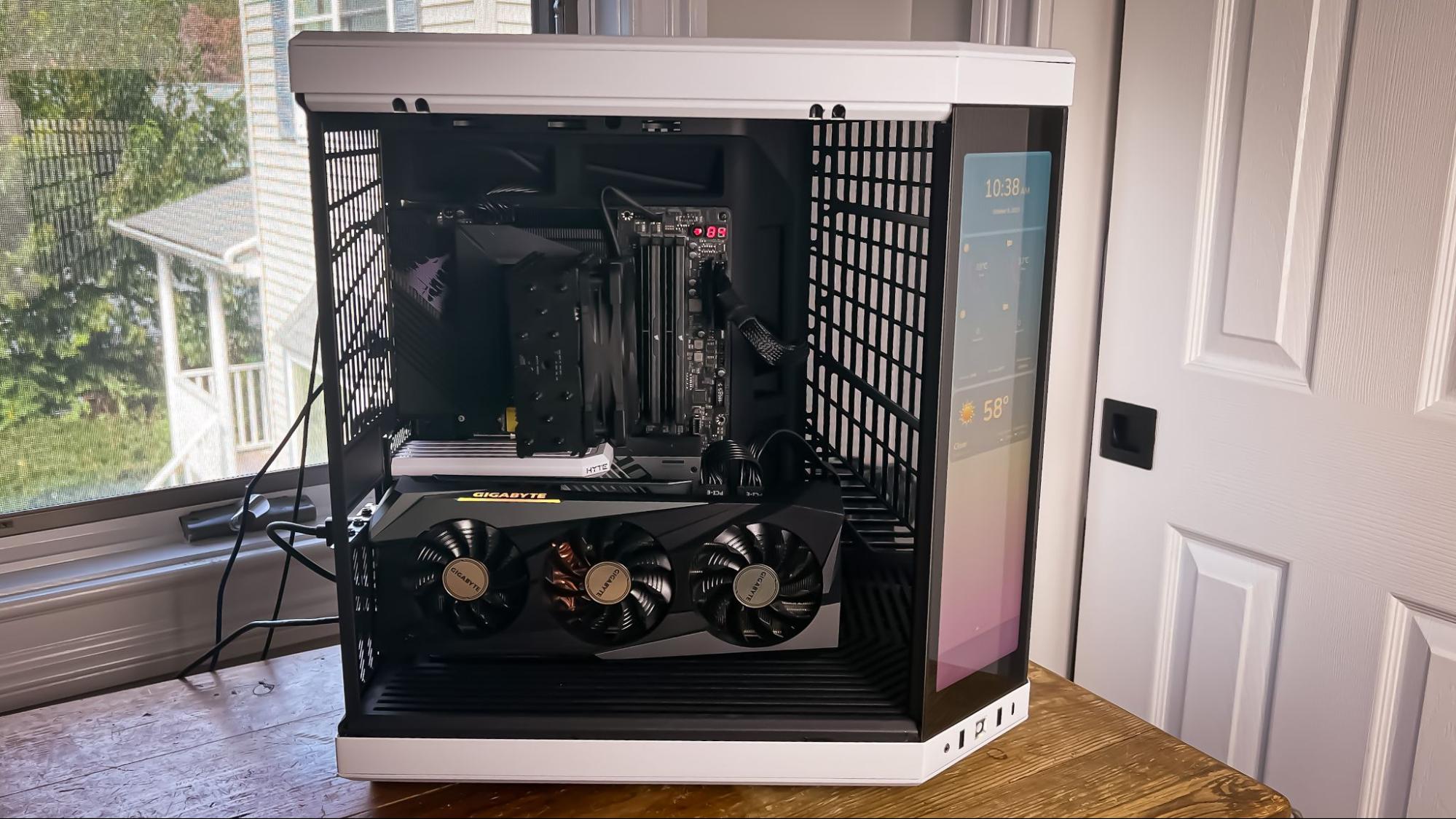PC case and components maker Hyte pauses shipments to U.S. customers amid tariff pressures
The company is feeling the pinch due to the newly introduced import tariffs

Hyte, a popular case manufacturer known for sleek designs like the Y60 and Y70 Touch, has temporarily paused shipments of certain products to the U.S. The move comes as the company prepares for new tariffs on Chinese-manufactured goods implemented by the Trump administration.
In a recent AMA (Ask Me Anything) session on Reddit, Hyte’s Product Director, Rob Teller, said that while the company is still fulfilling open customer pre-orders, all other shipments have been paused or redirected to other regions. He also added that the company strives to be as transparent as possible regarding shipment timelines for delayed orders, though some uncertainty remains with their manufacturing partners.
A recent deep-dive video by Gamers Nexus on the ongoing tariffs fiasco gives more critical information. Hyte was quite transparent in sharing a complete cost breakdown of its Y40 PC case, where it is making a mere 5% profit, roughly $5 per unit sold before the tariffs. This means that any tariff increase would push the company into selling the product at a loss unless it raised prices.
While PC cases have been temporarily exempted from the newly announced 145% tariff on Chinese imports, they are still subject to pre-existing duties, including a 20% tariff on general imports and an additional 25% on aluminum derivative products. An extra 25% tariff under Section 301 is also expected to be implemented by the end of May. Meanwhile, other PC components like fans, coolers, and power supplies have not been spared, complicating matters for companies like Hyte that sell complete ecosystems of components.
Responding to a Gamers Nexus inquiry about why Hyte doesn’t manufacture its products in the U.S. instead of China, Teller explained that the costs would be prohibitively high. Currently, Hyte is exploring plans to shift a significant portion of its production to Vietnam and Thailand, although even this move is expected to increase costs by an estimated 30–40%.
Teller reassured customers that Hyte is working on longer-term solutions, including shifting manufacturing where possible and adapting logistics strategies to minimize disruptions. However, if tariffs continue to impact costs, chances are that some price adjustments across Hyte’s product lines might be unavoidable.
For now, customers in the U.S. with existing pre-orders can expect their shipments to arrive as planned. Still, those looking to purchase new Hyte products may face limited availability and potentially higher prices in the coming months.
Get Tom's Hardware's best news and in-depth reviews, straight to your inbox.
Follow Tom's Hardware on Google News to get our up-to-date news, analysis, and reviews in your feeds. Make sure to click the Follow button.

Kunal Khullar is a contributing writer at Tom’s Hardware. He is a long time technology journalist and reviewer specializing in PC components and peripherals, and welcomes any and every question around building a PC.
-
JamesLahey I would happily pay $140 or $200 instead of $100 for a product that was engineered and made in the US, Europe, Canada/Australia.Reply
I feel for boutique manufacturers who are just getting started (like Hyte) but this is not going to be an easy process. The West has allowed itself to be de-industrialized over a period of 30 plus years. It won’t come back overnight, but I feel this is worth trying to do.
Others may disagree, but I’m old enough to remember when computers were built here, not just “designed in Cupertino”. -
EzzyB I was thinking about building a new PC. Given the GPU climate I'm holding off for now. But, with the tariffs I decided to go ahead and buy a North XL when I saw that Amazon was out of stock as was literally everyone except New Egg (who was still selling them at MSRP). Amazon, of course, already had scalpers trying to sell them for $349. (There seems to be a whole industry of third-party Amazon sellers that pounces on every out-of-stock listing to gouge unaware buyers.)Reply
Not sure if I needed to do that, but I was afraid the when they came back in stock they would have been subject to the tariffs. -
acadia11 17th century mindset in 21st century politics. We should bring back the Black Death that should solve our problems of over crowding and climate change. This is analogous to the idea of using the tarriffs to resolve the non-existent problem of globalization. Never mind that manufacturing jobs have been largely eliminated and replaced by automation and only makes sense to use humans you know in a place like China where they have 1.7 billion people and a cheap supply of well humans, even if none if it were true … globalization is here to stay and the disruption of trying to change a global supply chain built over basically a century based on “common sense economics” is silly. This fiasco is about as dxmb an idea as trying to turn Montana into beach front property. The bottom line American society needs to have the right skill set to function in the new labor markets that naturally evolve and lead on innovation. Sure you could build a beach in Montano but at what cost and why?Reply -
EzzyB I'm old, like really old. When I was a teenager everyone was screaming because the products they bought were "Made in Japan". That was replaced in the 80's with "Made in Taiwan". Now it's "Made in China."Reply
Nothing new to see here. Apple is a good indication. If we're going to get into a tariff war with China, they're going to increase production in..... India. ¯\_(ツ)_/¯ -
acadia11 Reply
Right because unless you plan on working for 1 dollar an hour or we suddlenly grow our population by 1 billion people, it will never make economic sense to make many goods in the US, not to mention things we can’t make in the US. I hear we have the perfect weather and altitude for growing coffee beans … oh wait never mind. The issue is not made in china it’s that it’s not made in the USA and for good reason.EzzyB said:I'm old, like really old. When I was a teenager everyone was screaming because the products they bought were "Made in Japan". That was replaced in the 80's with "Made in Taiwan". Now it's "Made in China."
Nothing new to see here. Apple is a good indication. If we're going to get into a tariff war with China, they're going to increase production in..... India. ¯\_(ツ)_/¯ -
YSCCC Reply
But, to be realistic, with the regulations, wages and/ or machinery all being made in USA any such product won't go from $100 to $200, it will be lucky if they can retain the margin and able to sell you below $500JamesLahey said:I would happily pay $140 or $200 instead of $100 for a product that was engineered and made in the US, Europe, Canada/Australia.
I feel for boutique manufacturers who are just getting started (like Hyte) but this is not going to be an easy process. The West has allowed itself to be de-industrialized over a period of 30 plus years. It won’t come back overnight, but I feel this is worth trying to do.
Others may disagree, but I’m old enough to remember when computers were built here, not just “designed in Cupertino”. -
Blacksad999 There are more jobs in the US than there are people to fill them.Reply
Who exactly are these people who are going to line up for grueling, low paying factory work?? We've scared off or deported migrant laborers to the point where the farming, dairy, and meat packing industries are in serious trouble because Americans largely won't do those jobs.
If they think a bunch of mediocre at best factory jobs are some sort of boon, they're sorely mistaken here. They'll have to pay tariffs on all of the raw materials they need to manufacture anything now, as we don't have everything we need to produce goods, and American workers will demand significantly higher wages. All of these costs would be passed on to consumers, making even "made in USA" goods excessively expensive. Maybe moreso than just importing and paying the tariffs. -
BloodLust2222 Reply
Tariffs in the 1000's still won't outweigh the cost of making stuff in America. It makes zero economic sense for any company to build a factory in America to make these sorts of things. You are right on every aspect. Companies know people in America can neither afford or would be willing to pay $700 for a pair of Nikes just because they are "Made in America".Blacksad999 said:There are more jobs in the US than there are people to fill them.
Who exactly are these people who are going to line up for grueling, low paying factory work?? We've scared off or deported migrant laborers to the point where the farming, dairy, and meat packing industries are in serious trouble because Americans largely won't do those jobs.
If they think a bunch of mediocre at best factory jobs are some sort of boon, they're sorely mistaken here. They'll have to pay tariffs on all of the raw materials they need to manufacture anything now, as we don't have everything we need to produce goods, and American workers will demand significantly higher wages. All of these costs would be passed on to consumers, making even "made in USA" goods excessively expensive. Maybe moreso than just importing and paying the tariffs. -
thestryker Reply
While this is true of a decent number of people the chances of there being enough to maintain business is low. CaseLabs is a perfect example of where they were already a high cost boutique case builder and raw material costs helped drive them out of business in short order.JamesLahey said:I would happily pay $140 or $200 instead of $100 for a product that was engineered and made in the US, Europe, Canada/Australia.
The biggest issue is rarely materials or assembly but rather the entire supply chain. I think this is something that never gets enough acknowledgement when it comes to business deals. Intel's Ohio fabs as an example, assuming they still happen, will bring more jobs to the area due to the supply chain required for operation than Intel themselves does for operating them.
I can't imagine the cost required to build up a modern manufacturing supply chain that resides entirely in North America. It would likely take giant government subsidies and/or a decade or more to get in place. -
thestryker Unfortunate for Hyte and hopefully there's some real concrete guidance sooner than later with regards to what is now a very fluid landscape. I kept hoping they'd get more AIOs out, but that's looking less and less likely as time goes on.Reply